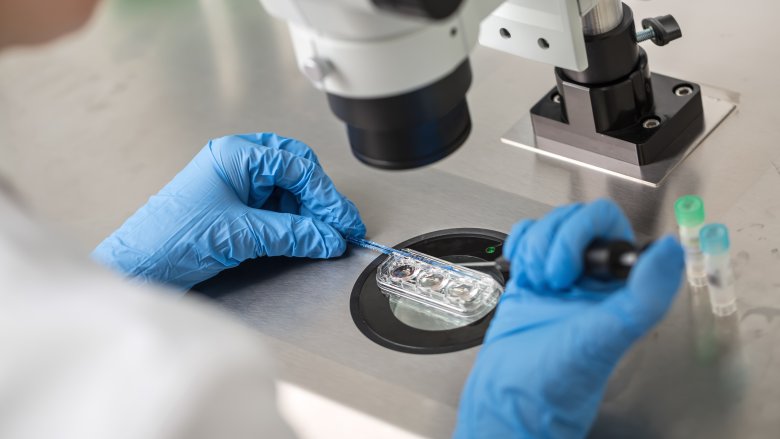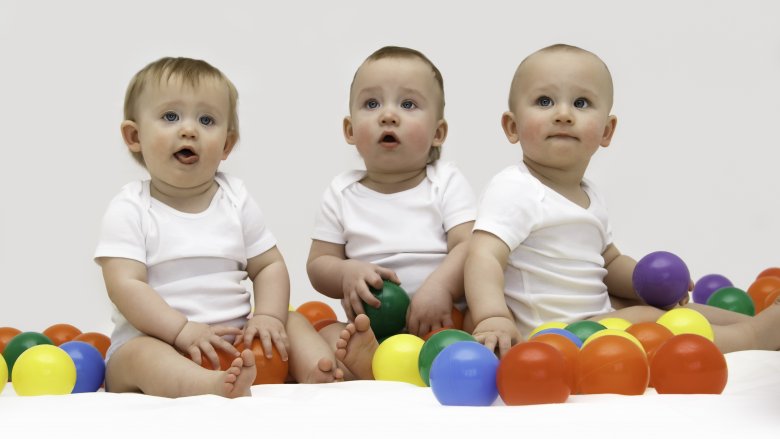Times Fertility Clinics Implanted The Wrong Embryo
Infertility is devastating and life-altering. It destroys hopes and dreams and plans for the future, and sometimes it can even end marriages. Fortunately, there's a treatment for infertility, and when couples finally see that little blue stripe or hear the words "Congratulations, you're pregnant!" it can be an intensely joyful experience. Until the fertility clinic calls up and says the words, "Uh, actually, you won't believe this but..."
In-vitro fertilization (IVF) is not perfect. Sometimes it doesn't work. Sometimes it works too well. And sometimes fertility clinics screw up, and not in an "Oops, we accidentally scheduled your appointment during your doctor's vacation" kind of a way, either. When fertility clinics implant the wrong embryo, that's a mistake that can have huge legal and medical repercussions that last for the entire lifetime of those families and their children. Here are a few of the world's craziest and most famous cases of fertility clinic incompetence.
One of these babies is not like the other
Any adoptive parent will tell you, love doesn't have anything to do with genetics. But that doesn't seem to stop anyone from suing fertility clinics over questions of genetics.
In 2015, a couple in Connecticut used donor eggs and dad's sperm to conceive a baby. Everything went swimmingly, and a couple years later they tried for a second child with the embryos that hadn't been used the first time. According to the Daily Beast, the second treatment resulted in a baby boy, but the couple quickly realized that something was different — their new baby had "much darker skin pigmentation" and looked nothing like his brother. DNA testing confirmed that dad's sperm wasn't used to create the second embryo, which makes the new baby a half-brother to the older boy.
The lawsuit made sure to let everyone know that the second baby was "loved ... in every aspect," but that the parents were left with "life-long haunting uncertainties regarding their second-born son," the most sinister of which is the possibility that the child's biological father might one day show up with a custody claim. Hopefully, the lawsuit records were all good and sealed in case the poor kid decides to Google himself someday. "Of course we love you honey, suing the fertility clinic because you're not genetically related to us had nothing to do with whether or not we love you!" Wouldn't want to be a part of that awkward conversation.
Musical embryos
IVF isn't like taking a driving test. You can't just try, try again. First of all, IVF is expensive, and your health insurance might not pay for it. And there's no guarantee it's going to work. Some women don't respond to IVF medications. Sometimes the embryos just aren't viable. Sometimes implantation doesn't happen. So when the fertility clinic makes a mistake, it's not always just a matter of giving it another go.
According to BioNews, a 40-year-old-woman and her 38-year-old-partner had a son from their first IVF attempt and were ready to start round two when all their hopes were shattered like a test tube on a hard, concrete lab floor. Before the procedure, the senior embryologist at the clinic told them their embryo (preserved from the first round) had been accidentally destroyed in the lab. That wasn't the truth, though. The truth was that the embryo had been implanted in the wrong woman. And worse, when that woman found out she had the wrong embryo, she took a morning-after pill to terminate the pregnancy.
The mix-up was evidently the fault of the "trainee embryologist" (always blame the newbie), who grabbed the wrong embryo from the incubator and for whatever reason didn't check the name. Oops. Anyway, the end result was not just no baby for anyone, but no baby for the original couple ever, since it was their last remaining embryo and their chances of having another child after that were "slim."
And they all lived happily ever after (mostly)
So what happens when an embryo ends up in the wrong person and the biological parents and the surrogate parents all know the truth? Whose baby is it?
"The wand is on my abdomen and the technician's talking to someone else," Carolyn Savage told the San Diego Union Tribune. "'There's your baby's nose. There's your baby's head. It was surreal."
Savage and her husband made an unusual choice — instead of terminating the pregnancy and starting over with the right embryos, Savage decided to carry the pregnancy to term and then hand the baby over to its biological parents. And because this story isn't tear-jerky enough already, Savage gave up her last chance to carry her own baby to term because she was 40 and had a history of difficult pregnancies, which meant she wouldn't be able to safely attempt another pregnancy.
The two families formed a friendship that lasted after the baby's birth, and the Savages eventually went on to have twin girls via surrogate, though they say they suffered emotionally from the experience. But for the most part, they're the exception to the rule — fertility clinic mix-ups don't usually have endings this happy.
The accidental sperm donor wins
Sometimes fertility clinics who make mistakes come clean immediately and accept full responsibility for their error. That's a sign you're dealing with real medical professionals — doctors (and even trainee embryologists) are human, so it's not surprising that mistakes sometimes happen. But professionals don't lie, cover up, and try to blame their mistakes on other people.
So we're going to say that the San Francisco clinic that gave Susan Buchweitz the wrong embryos was not really behaving professionally when they tried to hide their mistake for 10 months. And it gets worse — according to the Associated Press, after the error came to light, the biological parents of Buchweitz's son gave birth to his sibling and then decided they also wanted the baby Buchweitz gave birth to.
The biological father of Buchweitz's son sued for full custody, perhaps without fully understanding what a jerk move that was. The judge disagreed, so bio-dad was granted partial custody, and now Buchweitz has to share parental decisions with some dude she never met before a fertility clinic accidentally put his genetic material in the wrong place. As compensation, though, she did get a $1 million settlement from the fertility doctor who covered up the mistake. And they say there's no justice in the world.
Just kidding about that signed visitation agreement
In this case, a woman named Donna Fasano was implanted with the wrong embryo and returned the child to its biological parents, but this time there was no family bonding, no happy exchanges of photos and progress reports, and no warm fuzzy feeling for the reader. According to the Guardian, both couples learned of the mistake early on and entered into the whole messy affair feeling suspicious and hostile toward each other.
Fasano became pregnant with twins: The first was her biological child, and the second was the biological child of Deborah Perry-Rogers. After the babies were born, Fasano gave the second baby to Perry-Rogers. She wanted visitation rights, though, and at first Perry-Rogers and her husband agreed, but then they decided they didn't want their accidental surrogate anywhere near their kid. In fact they got a judge to agree that they didn't have to honor the signed visitation agreement, because of reasons.
Unfortunately, hostility and suspicion and lawsuits and custody disputes and abortions tend to be the norm when these things happen, so this isn't really a sad case of multiple family tragedy as much as it's another example of why fertility clinics need to do a much better job of making sure that things like this never, ever happen.
What's more important, love or biology?
While the courts in the U.S. seem to favor biology over love and nurturing, the courts in other countries have given more weight to the physical and emotional act of carrying a pregnancy to term and then loving and caring for the baby you gave birth to. Go figure. In London, a woman gave birth to twins after a stranger's sperm was accidentally used to fertilize her eggs. According to CNN, the mistake might have gone unnoticed except that the mother and her husband (who was supposed to be the sperm donor) were both white, and the twins were black.
In this case, a British court ruled that the sperm donor was the legal father, but also declined to remove the babies from the custody of their birth mother and her husband. "Although they lose the immediate certainty of the irrebuttable presumption that [the husband] is their legal father, they will remain with their loving, stable, and secure home," the judge said, adding that the husband could legally adopt the twins.
Similarly, in 1997 a woman in the Netherlands gave birth to twins with different fathers, and the judge ruled she could keep both babies. So the moral of the story is, if you're planning to accidentally become the surrogate of another couple's baby, you should be in Europe where you're treated as more than just an incubator for biological material. But don't worry, it will never happen to you. Probably.
That baby is not yours and oops, it's not that other person's either
So just in case you thought fertility clinic mix-ups were between a woman, her doctor, and the other woman who accidentally got her embryos, it turns out that fertility mix-ups can sometimes involve more than just two women and their partners.
According to the BBC, in 2002 there was a case involving not two but three women, and it went like this: Woman A and Woman B were undergoing fertility treatments at a clinic in the U.K. Woman A had two sets of embryos. The first was "poorer quality" and the second was "best quality," but for whatever reason Woman A ended up getting implanted with the "poorer quality" set while Woman B accidentally got Woman A's "best quality" set. So that was bad but then there was Woman C, who ended up with the embryos that Woman B was supposed to get. Woman B and C both had to undergo emergency medical procedures to prevent pregnancy. It's not clear what happened to Woman A and her "poorer quality" embryos, but let's hope there was at least some happy ending in there somewhere.
The hospital called it an "administrative mix-up," you know, like when the office manager accidentally buys coffee with money from the copy paper fund. In their defense, they did discover the error right away, they did apologize, and they did suspend the appropriate scapegoat. Wonderful.
The genetic abnormalities are free
Okay, so you become the victim of a fertility clinic mix-up. Assuming no vicious custody battle and lawsuit, you'll probably still love your baby and raise it as your own. After all, tens of thousands of American couples adopt children every single year, and just about every one of them will tell you that biology doesn't matter.
So that's something to cling to, except ... what if the embryos you accidentally got were someone else's embryos and also they were someone else's genetically abnormal embryos?
Reveal says that's what happened to Malissa Pineda, who was undergoing IVF treatment at a clinic in Torrance, California. After the procedure, Pineda was called back into the clinic and told that all 14 of her embryos were still in the petri dish, which could only mean one thing: Pineda had been implanted with someone else's embryos.
The doctor performed an emergency procedure to remove the embryos, which were actually genetically abnormal embryos that were waiting to be destroyed. But Pineda wasn't actually asked if she wanted to have the embryos removed; the doctor performed the procedure without explaining what he was doing. But hey, he offered to start over again for free, so cool? Shockingly, Pineda declined. She went through IVF two times with a different clinic, but wasn't able to carry either of those pregnancies to term. So no happy endings there, either.
And I would have gotten away with it, too, if it hadn't been for that meddling genetic testing
Some fertility clinic errors are discovered early on and remedied, with varying degrees of human drama and emotional scarring. Sometimes the errors are discovered early on and the doctors are all, "We could remedy this with varying degrees of human drama and emotional scarring, but maybe it's better to just shut our mouths and hope no one notices." And sometimes no one has any idea that there was a mix-up until after the child is born and circumstances lead to a big, painful reveal.
That happened in Poland when a woman gave birth to a child she'd conceived through IVF and later learned that the baby was not related to her. According to Radio Poland, the baby girl was born with multiple birth defects, which prompted the couple to ask for genetic testing. The baby's DNA revealed that the man was indeed her biological father, but that her biological mother was someone else.
It's not clear how this particular story ended — let's hope the birth defects were minor, the woman excused the whole "not related to me" part of the equation, and they all lived happily ever after. That would make for a nice change of pace, wouldn't it?
Genghis Khan with a used pipette
So way back in the caveman days, and also in some parts of Utah, fathering lots of children was just what dudes were expected to do. It made sense: Have lots of kids and your genetics will live on forever, and isn't that nature's ultimate proclamation? Just ask Genghis Khan's 16 million male descendants.
Today, we mostly frown on guys who test out their virility on lots of different women. The problem is, though, that one guy with one magazine in the back room of a fertility clinic can potentially produce enough genetic material to give Genghis Khan a run for his money, provided that genetic material gets accidentally distributed to, say, 26 different women.
According to Redbook, a "procedural error" at a clinic in the Netherlands somehow resulted in one guy's sperm potentially fertilizing eggs from 26 different couples. Now, that's some seriously stupendous procedural error that escapes the wildest imaginings of most human brains. Here's how it happened: A lab tech evidently wasn't aware that it's not just the pipette that needs to be changed during fertilization procedures, it's also the rubber top of the pipette. So theoretically, some of the original guy's sperm could have wound up in the wrong eggs. Granted, it's not super likely, so if he was hoping to become the next Genghis Khan, well, he might have to do the whole male virility thing the old-fashioned way. Hopefully he won't.
Is 'fertility fraud' really the right name for this?
Donald Cline was going about a pretty normal life being a fertility doctor in Indianapolis when he suddenly arrived at the bizarre and totally not-okay conclusion that he should sire a line of mini-Clines but without the knowledge of anyone but himself. Cline may have inseminated 50 women with his own sperm, which definitely was not in the fine print of anyone's contract.
According to the Chicago Tribune, there are repercussions beyond just the horrible ickiness of it — children who find out that they were conceived against their parents' wishes may suffer from psychological trauma and questions about whether they really belong in the world. But here's the punchline. Cline got off pretty lightly because the legal system just wasn't set up for "fertility fraud." He was charged with obstruction of justice, false advertising, and immoral conduct. His punishment: a $500 fine, one year's probation, and the loss of his medical license.
The case changed the laws in Indiana, though — in 2019, Indiana's governor signed the nation's first fertility fraud law, which allows for civil action when a fertility doctor misuses genetic material and is icky in general. It's a little late as far as Cline himself is concerned, but better late than pregnant with some random fertility doctor's baby, right?
I promise to help you make your dreams of a healthy baby a reality and ... ugh, forget it
And finally, this very strange case gets an honorable mention because it's not really about fertility clinics implanting the wrong embryo or the wrong embryo getting implanted the old-fashioned way — it's about an embryologist who Just. Couldn't. Be. Bothered. Yes, in a story that calls to mind Homer Simpson if Homer Simpson were falling asleep in front of a bunch of petri dishes instead of a nuclear control center, this 44-year-old embryologist gave test tubes full of saline solution to the doctors he worked for because apparently it was just too much trouble to actually mix eggs with sperm. You know, his job. And, according to the Guardian, at least eight women who were treated at the clinic learned much later on that they had unused embryos in storage at the clinic — presumably, embryos that were supposed to be implanted during treatment.
The embryologist was found guilty on eight charges of false accounting and three charges of assault. The assault charges stemmed from cases where embryo-free test tubes were used during treatments. Tellingly, that clinic did not achieve any pregnancies between 1997 and 2000, which is not only really, really bad for business but is yet another indication that maybe there were more than just a handful of women victimized by that particular embryologist.
So in conclusion, maybe you're better off doing IVF with an eye dropper and three wishes from a genie. Just a suggestion.












